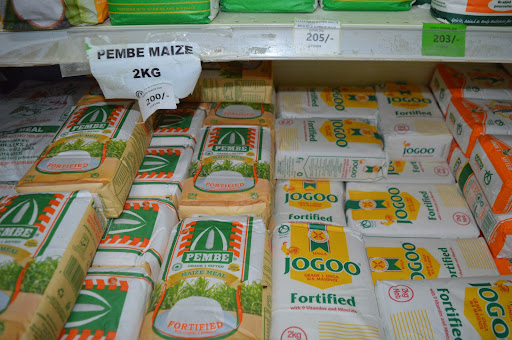
How to make Rice flour pancakes
Pancakes made with rice flour and gluten-free flour from ground rice.
Kagwe has revealed plans to gazette importation of 5.5 million bags of duty-free yellow maize.
In Summary

Audio By Vocalize

Consumers have been dealt a fresh blow as maize flour prices have soared by nearly Sh40, driven by shrinking supply of maize and rising costs at the farms.
The
increase has pushed a 2kg packet of unga to as high as Sh169 in some
supermarkets, sparking concern over food security and inflation
pressure.
Maize flour prices
have risen sharply over recent months, with a 2kg packet now retailing
at an average of Sh160, up from Sh100 to Sh120 in December 2024 and
early January 2025. The nearly Sh40 jump has been attributed by millers
to shortage of maize supply across the country.
A spot check in several supermarkets revealed significant price disparities among major brands. Ndovu is retailing at Sh164, Pembe at between Sh162 and Sh169, Jogoo at Sh156 to Sh158, and Soko at Sh164.
The price of a 90kg bag of maize has also surged, currently selling at Sh4,700, up from Sh3,800 two
weeks ago. Millers anticipate the price of maize could shoot up to a
high of Sh5,000 in the coming months due to the shortage.
Data
from the Kenya National Bureau of Statistics shows that a 2kg packet of
fortified maize flour averaged Sh165.05 in March 2025, the highest price recorded in over a year. This marked a 2.9 per cent increase from February and a 14.1 per cent rise compared to October 2024.
Agriculture Cabinet Secretary Mutahi Kagwe warned farmers allegedly hoarding maize in anticipation of further price hikes.
“We are aware of maize stocks being held by individuals who hope prices will keep rising. Unfortunately for them, that will not happen,” he said.
To mitigate the price surge, Kagwe said the government will release maize from the National Cereals and Produce Board strategic reserves.
“We will release maize from our reserves to ensure prices remain stable.”
Kagwe
also announced that Kenya is coordinating with Tanzania to facilitate
maize imports through the East African Community framework.
“We trade maize freely within the East African Community, and we’re confident supplies will start flowing in from Tanzania,” he said.
In a move to reduce pressure on white maize for human consumption, support
feed millers and reduce animal feed prices, Kagwe revealed plans to
gazette the importation of 5.5 million bags of duty-free yellow maize.
“This yellow maize will be imported directly by feed manufacturers and is intended to ease the pressure on white maize and feed costs,” the CS said.
Despite the government’s claims of hoarding, Antony Kioko, CEO of the Cereal Growers Association, refuted the allegations.
He told the Star on phone that the main harvest was completed in December with some spills into January. “No
small-scale farmer can afford to store maize for months after
harvesting. They usually sell immediately due to urgent financial needs,” he said.
Kioko
also cautioned against the government’s repeated reliance on imports
during maize shortages, arguing that such a strategy is unsustainable in
the long-term.
“We
need long-term strategies for improving local production. While the
fertiliser subsidy is a step in the right direction, farmers still face
numerous other costs that need government support,” he said.
As of now, the NCPB holds 709,000 bags of maize in stock, priced at Sh3,500 per 90kg bag.

Pancakes made with rice flour and gluten-free flour from ground rice.